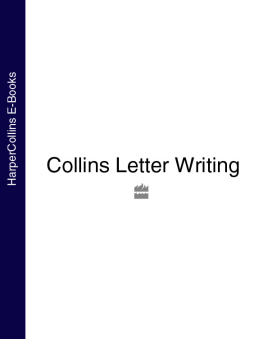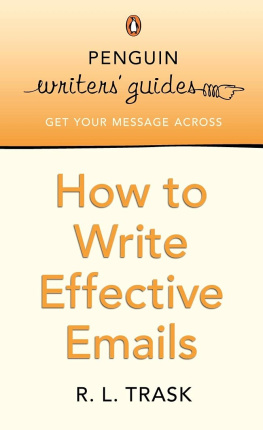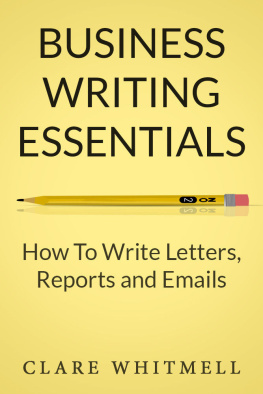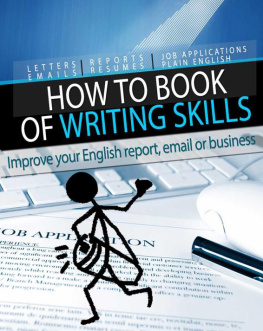PENGUIN WRITERS GUIDES
How to Write Better Letters
Cherry Chappell is an independent public relations practitioner and writer. Trained originally as a journalist, she regularly reverts to type, writing features for national newspapers and magazines. Cherrys first book, Minding Your Own Business: Survival Strategies for Starting Up on Your Own, was published in September 2004. She has friends all over the world and so is an inveterate letter-writer.
The Penguin Writers Guides
How to Punctuate George Davidson
How to Write Better English Robert Allen
How to Write Better Letters Cherry Chappell
How to Write Effective Emails R. L. Trask
Improve Your Spelling George Davidson
Writing for Business Chris Shevlin
PENGUIN WRITERS GUIDES
How to Write
Better Letters
CHERRY CHAPPELL

PENGUIN BOOKS
PENGUIN BOOKS
Published by the Penguin Group
Penguin Books Ltd, 80 Strand, London WC2R 0RL, England
Penguin Group (USA) Inc., 375 Hudson Street, New York, New York 10014, USA
Penguin Group (Canada), 90 Eglinton Avenue East, Suite 700, Toronto, Ontario, Canada M4P 2Y3
(a division of Pearson Penguin Canada Inc.)
Penguin Ireland, 25 St Stephens Green, Dublin 2, Ireland
(a division of Penguin Books Ltd)
Penguin Group (Australia), 250 Camberwell Road, Camberwell, Victoria 3124, Australia
(a division of Pearson Australia Group Pty Ltd)
Penguin Books India Pvt Ltd, 11 Community Centre, Panchsheel Park, New Delhi 110 017, India
Penguin Group (NZ), cnr Airborne and Rosedale Roads, Albany, Auckland 1310, New Zealand
(a division of Pearson New Zealand Ltd)
Penguin Books (South Africa) (Pty) Ltd, 24 Sturdee Avenue, Rosebank, Johannesburg 2196, South Africa
Penguin Books Ltd, Registered Offices: 80 Strand, London WC2R 0RL, England
www.penguin.com
First published 2006
Copyright Cherry Chappell, 2006
All rights reserved
Extract from A Profound Secret by Josceline Dimbleby, published by Doubleday/Black Swan,
reprinted by permission of the Random House Group Ltd. Extract from Dear Mariella by
Mariella Frostrup, published by Bloomsbury, reprinted by permission of the author.
Extract from Martha Gellhorn: A Life by Caroline Moorehead, published by
Chatto & Windus, reprinted by permission of the Random House Group Ltd.
Every effort has been made to trace copyright holders but this has not been possible
in all cases. If notified, the publishers will be pleased to rectify any omissions at the
earliest opportunity.
The moral right of the author has been asserted
EISBN: 9780141905075
For Mansel and Joan
Contents
Letter from the Author
Dear Reader,
Not long ago, I sat opposite a young foreign student on an underground train and idly watched him as he opened a letter. His face lit up. Photos fell out. He whooped. He then read his letter, smiling and even laughing out loud at one point. His delight cheered me up, along with everyone else around us. When he left the train, still hugging his letter, I felt he would find time later to read it again and maybe a third time. Perhaps he was homesick and the letter was from his family; maybe it was from a special girl. Well never know, but the incident reminded me of the importance of personal letters. A handwritten letter or note, perhaps to a friend who is going through a tough time, is much more intimate and caring than an email or a text message, and can be read again and again. A good luck note may give the recipient confidence.
There are many other reasons why letters remain an important means of communication. Despite mobiles, land lines, broadband and text messaging, there are still occasions when it is much more appropriate to write a letter. In an official sphere for instance, when you are making a complaint a letter has a legal presence. In other instances, a letter shows a commitment and a strength of purpose that an email message may not. Then, sometimes, we need to send a covering letter for forms we must fill in, for that important job application perhaps.
Unlike speaking to someone directly or on the phone, the value of writing a letter is that it is not immediate; it gives the writer time to structure the communication, select the right words, consider the tone and style, polish it, maybe put it to one side and read it again, reflect and ponder, so that the final version is precisely what you wish it to be.
Sometimes letters are better written on paper and posted with a stamp, while others can as easily be despatched as an email. Whatever the means of delivery, writers will wish to express themselves fluently and appropriately. You will probably want to give special meaning to a personal letter, and ensure that it is one the recipient will relish reading and perhaps treasure. On the other hand, you will need to ensure that business and official letters contain all the necessary information, but are presented with clarity and brevity. Busy people need to understand in the shortest possible time what your letter is about and what you require of them. You are more likely to receive a prompt and positive response if your letter is easy to read and concise.
Some people adore writing letters I certainly do. Others, for a variety of reasons, find writing letters a chore to postpone as long as possible, or something to be drafted, redrafted and worried over. Still other people enjoy scribbling a note to a chum, but seize up when faced with an official invitation. Most of us find writing a letter of condolence, so important to someone who has recently been bereaved, the hardest one of all.
This guide is designed to help you enjoy yes, enjoy the process of letter-writing. If you are writing about a job, its probably wise to ask someone to check for spelling mistakes and other howlers but, for most other kinds of letter, it is better to go ahead and write errors and all than never to have written at all.
With best wishes,
Yours sincerely,
Cherry Chappell
Chelsea, London 2006
Acknowledgements
I am immensely grateful for all the help, time and support so many people have given to me in writing this book. In particular, I would like to thank:
Andie Airfix of Satori; Kevin Allen; Theresa Britt of the Open University; The Duke of Buccleuch; The Cornish Hospices; Victoria Crawford; David and Sheila Crawley; Gareth Davies and Dan Mars from the Cleft Lip & Palate Association; Malcolm J. Dyson of M & M Carpet Contractors Ltd; Nick Elliott, director of international business, Romeike International; Richard Elsen of Bell Yard Communications; Shernaz Engineer of Verity; Nick Gundry; C. Hamblet; Daniel Hannan, MEP for South East England; Christobel Hargraves and Steven Dowling of the National Confidential Enquiry into Patient Outcome and Death; Mrs Valerie Harrison; Christine Herbertson; Majid Ichalhane; John Jackson-Okolo; Jackie Jennings; Marz-been and Paurrush Jila; Councillor Jenny Kingsley; Jill Lee of Artbeat; Patricia Marriott; Dr Vivien Martin; Dr Susan Mayor; Ann Mealor of the Chartered Institute of Public Relations; Laura Morris; Christine Mouli; Ali Musa of MacMedicine; Tony Northcott of the Trading Standards Institute; Steve Pound, MP for Ealing North, and his parliamentary manager, Sophie Hosking; Stephen Pritchard of the Observer; Paul Scott-Lee, QPM DL, Chief Constable of West Midlands Police; Andy Simpson, readers letters editor of the Daily Mail; Julia Smith; Peter Lippiatt and Catherine Condor of Smythson of Bond Street; Carole Stone; Corinne Sweet; Gillian Swift; Claire Thomas, HR Manager of Penguin Books; Tristan Vanhegan.









